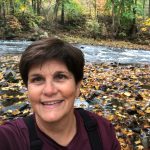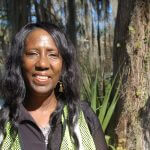Anna-Lisa Castle
Chicago, Illinois
Anna-Lisa joined the Alliance in February 2017, bringing a strong writing, research and advocacy background to the Alliance for the Great Lakes. In her role as Water Policy Manager, Anna-Lisa implements policy and advocacy campaigns across the Great Lakes region to protect clean drinking water, advance water infrastructure funding and financing priorities, ensure water affordability for Great Lakes residents, and move invasive carp prevention efforts forward. Anna-Lisa serves as a convener, organizer, and relationship builder at all levels of government with an emphasis on state level policy across the region and municipal issues in Northeast Illinois. Prior to joining the policy team, Anna-Lisa served as Content Manager and Staff Writer at the Alliance, in which she developed strategies to engage tens of thousands of constituents and created a broad range of content to advance the Alliance’s volunteer programs, advocacy campaigns, and organizational development goals.
This interview was conducted by Carly Schmidt on May 24, 2021. Learn more about Anna-Lisa’s work at greatlakes.org.
Tell me about your drinking water work and what your priorities are right now.
Drinking water is one of my greater passions in the water advocacy space and it’s a primary focus for me in my role at the Alliance. My team at the Alliance works across the Great Lakes region to advance drinking water affordability, lead-free water, and equitable investment in drinking water systems across levels of government – and I love the breadth of work. I have the pleasure of taking a deeper focus on clean water challenges at the municipal and state levels in Chicago and Illinois, while connecting back to the regional context. One of my favorite parts of my job is working with partners to get to the root of our drinking water challenges and workshopping ideas and strategies to advance solutions around lead service line replacement and water service affordability. I also get to bring a team of Illinois clean water leaders to D.C. every spring to share our water policy priorities with members of Congress as part of the Healing Our Waters Coalition’s Great Lakes Days, with lots of follow-up throughout the year. I’ve been really grateful to be able to be in conversation with folks from most of the Great Lakes states on these issues and to convene a group of regional partners that can learn from each others’ experiences and expertise.
Prior to my current role, I was on the communications team at the Alliance, where I wrote and edited all kinds of content about Great Lakes issues and water policy, developed digital materials and strategies for mobilizing people to take action. I spent a lot of time connecting with our constituents and sharing education and advocacy materials to help them take action for clean water. During that time, I put myself through a masters program in public policy and administration at Northwestern University. It became a very organic transition to the policy team.
It sounds like there is some great collaboration happening around the Great Lakes. How are you seeing these coalitions and partner groups coming together at this moment?
I think we are in a position to see some really important clean water priorities come to fruition at the federal level. But winning stronger environmental protections and investments in clean water requires sustained advocacy and coordination across levels of government, with leadership from the bottom up. It’s not enough for lawmakers to pass a bill in Washington. We have to pay attention to administration and implementation on the ground to ensure our clean water challenges are actually being addressed in an equitable way. I have seen coalitions and networks of groups step up to lend their respective expertise and support that feedback loop with decision makers and the communities they’re accountable to on a continuous basis.
One example that comes to mind is the movement for lead-free water. There is no safe level of lead in drinking water. But millions of people are essentially drinking through lead pipes. Communities and nonprofit partners around the Great Lakes are pushing for affordable, equitable lead service line replacement (LSLR) programs. This is a big action item in the region right now, and it’s great to see momentum around this at the federal level. Many communities are working for accountability, transparency, and affordability in LSLR plans at the local level and equitable funding and financing policies at the state level. So I see value in bringing people together across the Great Lakes region to share lessons learned. Hearing folks in Michigan share about their fight for safe, clean, affordable water and learning about best practices from water utility leaders in Ohio has informed efforts in Illinois, for example, and collectively we can make our voices heard across the Great Lakes.
What have you learned since you stopped convening in person?
Before the pandemic, we were building toward an in-person drinking water convening with “big green” type nonprofits, environmental justice groups, and community-led organizations. We pushed the event out at first, then it felt like all of that energy was redirected to water access issues in our respective cities and states as it became clear how serious and devastating the pandemic would be.
But water access is a human right always, not just in an emergency. This last year brought so many systemic injustices to light including water insecurity. In talking to peers, we kept coming back to, “What can we learn from this? What can we learn from each other? How do we make sure we don’t get caught in this vulnerable situation again?” I’ve been meeting with partners by Zoom like everyone else but I’m excited to meet in person, to get to hug my colleagues and friends in this work, and fight for a just recovery. At the same time, we are going to need farsighted, systemic changes to how we invest in water infrastructure and ultimately deliver water to people so that no one goes without, and no one goes broke because of their water bill.
I also hope to learn from the ways that I learned to work this year – I have tried very hard to do good work while honoring my full life. I’ve adapted to get my work done (mostly) as planned, but also to prioritize my community here on Chicago’s southwest side, my family and personal well-being, and responding to new and urgent developments during the uncertainty and unpredictability we’ve been living with for more than a year. I am privileged to have had the support and flexibility to do that. But I think we would be foolish not to challenge how we think about work and what we value after this year. My husband, mom, and sister are frontline workers and I have friends who are moms that have been struggling to stay in the workforce. Our economy and norms around work are largely not set up to be resilient, supportive, and functional for them. I think in the nonprofit sector, where doing good is literally in the mission, we should be at the forefront of building just work environments. I feel grateful to work with people who are reflecting on the challenges we’ve faced and are committed to building a more equitable, modern approach to work.
What can traditional nonprofits learn from community-led groups?
Putting out a million fires while also trying to stay the course and plan ahead is really hard, but immigrant communities of color like mine have been doing this forever. I see this in my volunteer work as part of my neighborhood environmental justice (EJ) organization. My really incredible neighbors have been partnering with mutual aid and distributing food to make sure that basic needs are being met. At the same time, as a community-based EJ group, we are also building our own capacity and advancing local priorities. We’re building the ship as we sail it, so to speak.
I think there’s a lot to be learned from community organizations both in terms of what we prioritize in our work and how we do our work. Just over the past year, I have heard many people in positions of power across the nonprofit sector and beyond reflect that we have to do better in terms of making room for and dedicating resources to necessary, intersectional work and in some cases, reevaluating our work and sharing power. Environmental justice cannot be separated from racial justice or economic justice. We need functioning democratic institutions to do our work as advocates. People don’t exist in a vacuum, policy shouldn’t either. I think that’s something that the community organizations I’m involved with understand and account for really well through their work.
Did you see any major wins come about when you were focused primarily on water shutoff moratoria?
I hesitate to call anything a win right now. So, so much has been lost. I think there was some movement, out of necessity, that I hope calls attention to the ways we need to change how we make sure people have access to clean water and sanitation. Broad water shutoff moratoria, for example, the federal Low Income Household Water Assistance Program (LIHWAP). That didn’t exist before. I think there will be an opportunity for us to learn from this, to get to the root of the longer-standing, underlying challenges facing our region’s water systems, and further develop solutions. I think that has to be part of a just recovery.
Given all the challenges around drinking water and environmental justice in the last year, what has kept you going?
I constantly find myself meeting and working with amazing people and getting inspired by leaders in the clean water advocacy and environmental justice spaces. Prior to the Alliance, I came from a community organization that really centered on people’s needs in the neighborhoods where we worked. Residents came together around a problem, developed solutions and advocated for themselves even while managing some really serious challenges like chronic illness, barriers to accessing healthcare, evictions, and systemic violence. In this work, it can be difficult to celebrate wins when the underlying issue persists and can feel insurmountable. But spending time being grateful, cheering for each other, and sharing joy with your team is really important in keeping me going. And rest. Knowing when to rest, I’m learning, is vital for the long haul.
In your policy and organizing role, what would winning look like for you?
Winning would mean that clean water is seen as a human right, and treated as such in public policy. Everybody could afford their water bill and everybody’s drinking water would be safe. Race, income, and zip code would not change one’s likelihood of experiencing or recovering from water challenges. We would repair harm to our waterways and the people that depend on them. The systems that we have in place to protect and distribute water would be equitable and functional to the point where we can weather the next crisis. Honestly, it looks like working ourselves out of a job.







